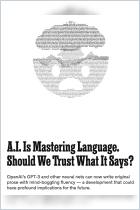
How to Tell If What You're Reading Was Written By AI
Don't believe everything you read (was written by a human).
Read or listen offline
Amazon KindleRecommendation
Do you feel confident that you could spot a real from a fake? The dawn of ChatGPT means that you can no longer trust that a human is the author of the book, essay, article, or report you are reading. So how can you navigate this new world? Happily Jake Peterson, the senior technology editor at Lifehacker, has become somewhat of a Sherlock Holmes when it comes to uncovering AI-generated text. He has identified several revealing tells to help even the least tech-savvy reader spot AI-generated content. So don your skeptical hat and do your due diligence.
Summary
About the Author
Jake Peterson is the senior technology editor at Lifehacker, an online source of tech-based tips and life advice. He writes on a broad range of tech-related issues, including devices, software, and subscriptions.












Comment on this summary